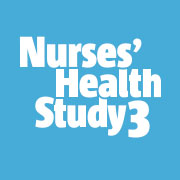Today, the Nurses' Health Studies are well-positioned to continue cutting-edge scientific research on reducing the burden of chronic disease. The growing data resources contribute to an accelerating pace of scientific discovery, and the potential continues to expand with sub-studies and the newest generation of the study, Nurses' Health Study 3.
Addressing compelling research questions
The research questions asked in the Nurses' Health Studies have adapted to participants' life-stages over time. Now, healthy aging and psychosocial issues of aging are burgeoning areas of research. For example, we now have exciting opportunities to investigate the maintenance of health and quality of life among cancer survivors. Studies of early life exposures (a key focus in the Nurses' Health Study II) evaluate whether prevention of cancer and other chronic diseases in later life might start in childhood and adolescence. Also, technological and statistical advancements enable us to link multiple types of biologic data (e.g., DNA, protein expression in tissue, epigenetics, RNA expression, metabolomics) with behavioral data, such as diet and lifestyle factors. This provides a greater opportunity for research on mechanisms underlying disease development and progression than ever before.
Expanding data collection in focused sub-studies
While we continue to collect data through biennial questionnaires to all participants, investigators increasingly are collecting detailed information among sub-groups of participants. Sub-studies are an efficient way for investigators to address timely research questions. For example:
 Nurses' Health Study participants enrolled in the Conservation of Hearing Study (CHEARS) completed repeat supplemental questionnaires and clinical hearing tests for an investigation of risk factors for hearing loss.
Nurses' Health Study participants enrolled in the Conservation of Hearing Study (CHEARS) completed repeat supplemental questionnaires and clinical hearing tests for an investigation of risk factors for hearing loss.- Lifestyle Validation Study: A subgroup of women in the Nurses' Health Study and Nurses' Health Study II participated in an extensive validation study of the questionnaire-based dietary and physical activity assessment methods, including providing multiple food frequency and physical activity questionnaires, 24-hour recalls of diet and physical activity, 1-week diet records, accelerometer measurements, 24-hour urine samples, and blood samples.
- Cognitive Function Study: A subgroup of Nurses' Health Study II participants are completing periodic web-based tests of cognitive function, providing information for future studies of risk factors for early cognitive decline.
Initiating new studies
 The Nurses' Health Study has led to other important cohort studies, including the ongoing Growing Up Today Study (GUTS). GUTS enrolled children of Nurses' Health Study II participants when they were 10 to 17 years old, allowing for exploration of the relation between early life exposures and health in adulthood. GUTS also provides unique opportunities to conduct inter-generational research with data from both children and their mothers.
The Nurses' Health Study has led to other important cohort studies, including the ongoing Growing Up Today Study (GUTS). GUTS enrolled children of Nurses' Health Study II participants when they were 10 to 17 years old, allowing for exploration of the relation between early life exposures and health in adulthood. GUTS also provides unique opportunities to conduct inter-generational research with data from both children and their mothers.
 Enrollment is also open for the next generation of the Nurses Health Studies: NHS3! NHS3 uses an entirely web-based data collection approach and is enrolling both men and women. The web-based format readily allows for personalized data collection, such as focused questionnaires on diet and lifestyle for pregnant participants. NHS3 will provide unique data that can be used to study health outcomes for generations into the future.
Enrollment is also open for the next generation of the Nurses Health Studies: NHS3! NHS3 uses an entirely web-based data collection approach and is enrolling both men and women. The web-based format readily allows for personalized data collection, such as focused questionnaires on diet and lifestyle for pregnant participants. NHS3 will provide unique data that can be used to study health outcomes for generations into the future.

